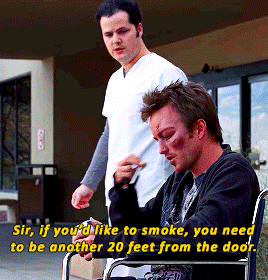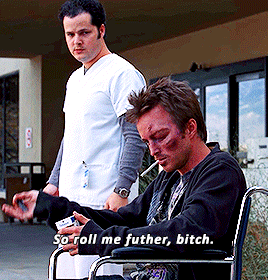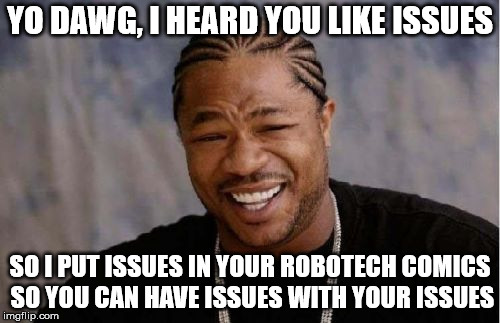Why I like 'old' fiction better than recent and present day fiction
- Peter Young
- Topic Author
- Offline
- Academy Cadet
-

- Posts: 145
- Thank you received: 96
Why I like 'old' fiction better than recent and present day fiction was created by Peter Young
A couple of years ago, at a comic fair, a standholder stated that quality of cartoons and comics was irrelevant. Kids will always like what they grow up with, the rest is just nostalgia.
Summing up all my arguments against this statement would make this to long a post. But discovering Robotech three years ago and 'Valérian and Laureline' almost a year ago affirms my belief that audiences CAN tell wether (in this example) a cartoon is made by craftsmen who take pride in their work or simply to earn money with something that fills airtime. Grew up with neither of the series (the latter was also made in 2006/2007), I liked it still.
Has any one read the article on Jack Kirby, of which I made a post about a month ago? One comment in it stuck on me: Kirby being a believer in communitarianism, the idea that individuals with different backgrounds and opinions can achieve what they want if they put aside their differences and work together. He did not portray his heroes as saints (I mean, Ben Grim/the Thing's short temper in the sixties made him a annoying character at first, even if it was because of his deformity), but he believed that people were better of together than on their own, and better of cooperating than going it alone.
One of several things most 80s cartoons, even if they were just made to sell toys to kids, had in common, was the idea that different people could work together. Most, almost all, series were about groups. And the few series with a main antagonist (He-man, Bravestar) still had side characters that lend hands .
Another great feature was the optimism. Antagonists did not just stop bad guys, they wanted to live up to certain standards. They wanted to be better than their foes, also in a moral aspect - even if Flint had to risk his life to save Cobra Commander's.
I used the cartoons as starting example, but it applies to other kinds of fiction as well. Both the original 70s Battlestar Galactica series and the 00s remake started with a depressing event: the almost extermination of humanity in space. But the original series focused on the positive: survivors banding together and heading for the one planet the could seek refuge and perhaps one day reclaim their home worlds. The remake on the other hand focused on the negative: in-fighting; paranoia (everyone could be a Cylon spy); Cylons being one step ahead all the time. I love the original series (not the second season a few years later), but lost interest in the remake after a few episodes.
I understand why series like A-team and Knight Rider were fictitious even in the old days, but I tend to prefer how those antagonists dealt with baddies over 00s and 10s series, where Jack Bauer and the NCIs-teams consider killing bad guys as part of the job. It might explain why the zomby-genre does not appeal to me: those stories tend to be set in post-apocalyptic worlds without hope, you can only try to make it through the day.
It's not the killing or the bloodiness (not that I like those), it is the absence of hope and idealism that seems to be lacking in most present day action fiction. Even the X-men have stopped aiming for a better world - nowadays, it's just survival.
Summing up all my arguments against this statement would make this to long a post. But discovering Robotech three years ago and 'Valérian and Laureline' almost a year ago affirms my belief that audiences CAN tell wether (in this example) a cartoon is made by craftsmen who take pride in their work or simply to earn money with something that fills airtime. Grew up with neither of the series (the latter was also made in 2006/2007), I liked it still.
Has any one read the article on Jack Kirby, of which I made a post about a month ago? One comment in it stuck on me: Kirby being a believer in communitarianism, the idea that individuals with different backgrounds and opinions can achieve what they want if they put aside their differences and work together. He did not portray his heroes as saints (I mean, Ben Grim/the Thing's short temper in the sixties made him a annoying character at first, even if it was because of his deformity), but he believed that people were better of together than on their own, and better of cooperating than going it alone.
One of several things most 80s cartoons, even if they were just made to sell toys to kids, had in common, was the idea that different people could work together. Most, almost all, series were about groups. And the few series with a main antagonist (He-man, Bravestar) still had side characters that lend hands .
Another great feature was the optimism. Antagonists did not just stop bad guys, they wanted to live up to certain standards. They wanted to be better than their foes, also in a moral aspect - even if Flint had to risk his life to save Cobra Commander's.
I used the cartoons as starting example, but it applies to other kinds of fiction as well. Both the original 70s Battlestar Galactica series and the 00s remake started with a depressing event: the almost extermination of humanity in space. But the original series focused on the positive: survivors banding together and heading for the one planet the could seek refuge and perhaps one day reclaim their home worlds. The remake on the other hand focused on the negative: in-fighting; paranoia (everyone could be a Cylon spy); Cylons being one step ahead all the time. I love the original series (not the second season a few years later), but lost interest in the remake after a few episodes.
I understand why series like A-team and Knight Rider were fictitious even in the old days, but I tend to prefer how those antagonists dealt with baddies over 00s and 10s series, where Jack Bauer and the NCIs-teams consider killing bad guys as part of the job. It might explain why the zomby-genre does not appeal to me: those stories tend to be set in post-apocalyptic worlds without hope, you can only try to make it through the day.
It's not the killing or the bloodiness (not that I like those), it is the absence of hope and idealism that seems to be lacking in most present day action fiction. Even the X-men have stopped aiming for a better world - nowadays, it's just survival.
6 years 8 months ago
#26505
Please Log in to join the conversation.
- Peter Young
- Topic Author
- Offline
- Academy Cadet
-

- Posts: 145
- Thank you received: 96
Replied by Peter Young on topic Why I like 'old' fiction better than recent and present day fiction
Off-topic: LG, before you start on NCIS: Los Angeles again: I don't like the NCIS-franchise, but I like that one series.
About three years ago I entered an epidose while zapping. That one story got my attention. A few days later again, with a different episode. A few months later, the series got repeated from season one.
Somehow the characters of that particular series appeal to me, even if I don't like the franchise. After starting to watch 'LA', I gave the original series a go as well, but still didn't like it.
Maybe because some 'LA' characters, despite the unusual job, still had 'realistic' traits, like Sam Hanna being a family men. Would I have become a fan if the second or third episode I watched had not been the one in which Granger found out he had an adult daughter - and questioned the wisdom of his life choices? Seems no coincidence to me I stopped watching after season 8. Sam's wife deceased and his kids away at college and boarding school - so much for the 'real life' connection.
Weren't it Lee and Kirby who decided to make super hero comics 'realistic' by having the adventures brought to 'life' by adding everyday aspects to them?
About three years ago I entered an epidose while zapping. That one story got my attention. A few days later again, with a different episode. A few months later, the series got repeated from season one.
Somehow the characters of that particular series appeal to me, even if I don't like the franchise. After starting to watch 'LA', I gave the original series a go as well, but still didn't like it.
Maybe because some 'LA' characters, despite the unusual job, still had 'realistic' traits, like Sam Hanna being a family men. Would I have become a fan if the second or third episode I watched had not been the one in which Granger found out he had an adult daughter - and questioned the wisdom of his life choices? Seems no coincidence to me I stopped watching after season 8. Sam's wife deceased and his kids away at college and boarding school - so much for the 'real life' connection.
Weren't it Lee and Kirby who decided to make super hero comics 'realistic' by having the adventures brought to 'life' by adding everyday aspects to them?
The following user(s) said Thank You: LadyGrimes
6 years 8 months ago
#26506
Please Log in to join the conversation.
- LadyGrimes
-

- Offline
- Robotech Master
-

- Easy Peasy Lemon Squeezy!
- Posts: 3840
- Thank you received: 947
Replied by LadyGrimes on topic Why I like 'old' fiction better than recent and present day fiction
Yes I agree older fiction is better by comparison, though there are exceptions. But also one thing to bear in mind, is that fiction has changed because the times have changed. You brought up how you feel most fiction today is about survival, well today it is all about survival. Our entertainment is a reflection of the current political climate of things, which explains all the social justice crap we're force fed now that was non-existent back then.
We're also going through a civil war these days too, so our entertainment is going to reflect that as well, no matter which direction you lean in politics. But I disagree that hope or idealism can't be present in today's fiction because it is.
I know how much you loathe The Walking Dead so I'll use that as an example. Yes it's about survival and morality in a world where the dead eat the living, but there's also a strong message which says the living are actually worse than the dead. This rings true with such antagonists from the series like the Governor, Gareth, and now Negan.
But what makes each of these villains interesting, is the fact they were regular men before the apocalypse, and now that their world has drastically changed so have the rules of survival. And each of these antagonists see their way of doing things as the right way. Each has their own idealism about how to survive, just like the protagonist Rick Grimes and his band of survivors.
Hope still remains with all of these people too, the good and the bad alike. They've all done things, some horrible, but it was all to survive because the hope that they can still live out their lives, keeps them going. Without hope there is no survival because what is there to even look forward to?
It's the hope of finding a safe haven free from the dead and their enemies, the hope of growing as a community and finding others in the world just like them, and the hope for a future where they can live as they did before the apocalypse as well as heal from their pasts. You have both realists and idealists and it's never just black or white, there is always a gray area. That is how morality is approached in the show.
We're also going through a civil war these days too, so our entertainment is going to reflect that as well, no matter which direction you lean in politics. But I disagree that hope or idealism can't be present in today's fiction because it is.
I know how much you loathe The Walking Dead so I'll use that as an example. Yes it's about survival and morality in a world where the dead eat the living, but there's also a strong message which says the living are actually worse than the dead. This rings true with such antagonists from the series like the Governor, Gareth, and now Negan.
But what makes each of these villains interesting, is the fact they were regular men before the apocalypse, and now that their world has drastically changed so have the rules of survival. And each of these antagonists see their way of doing things as the right way. Each has their own idealism about how to survive, just like the protagonist Rick Grimes and his band of survivors.
Hope still remains with all of these people too, the good and the bad alike. They've all done things, some horrible, but it was all to survive because the hope that they can still live out their lives, keeps them going. Without hope there is no survival because what is there to even look forward to?
It's the hope of finding a safe haven free from the dead and their enemies, the hope of growing as a community and finding others in the world just like them, and the hope for a future where they can live as they did before the apocalypse as well as heal from their pasts. You have both realists and idealists and it's never just black or white, there is always a gray area. That is how morality is approached in the show.
The following user(s) said Thank You: Alpha Bravo
6 years 8 months ago
#26511
Please Log in to join the conversation.
- Alpha Bravo
-

- Offline
- Moderator
-

- Posts: 1571
- Thank you received: 573
Replied by Alpha Bravo on topic Why I like 'old' fiction better than recent and present day fiction
"Offers that are selected that the deposit paid the amount that we do not decide, or the pool, sipping mulled wine, and in addition you can play table tennis, there is one drawback, I do not have rights." - random spambot (translated)
The following user(s) said Thank You: LadyGrimes
6 years 8 months ago
#26518
Please Log in to join the conversation.
Time to create page: 0.274 seconds



